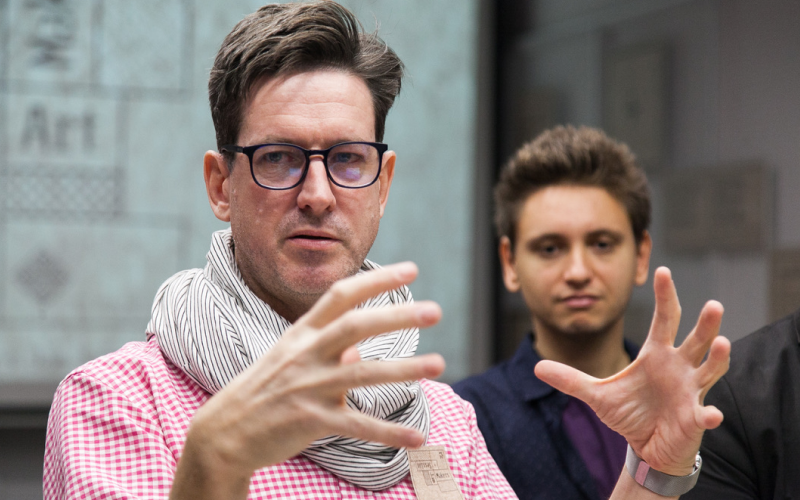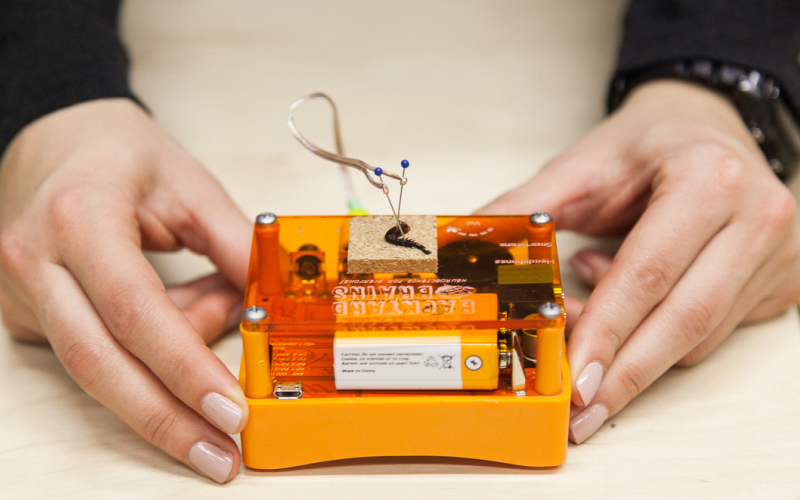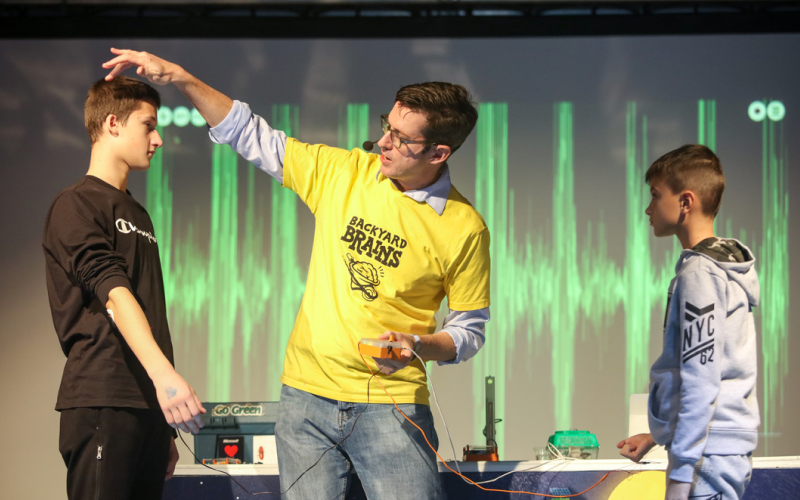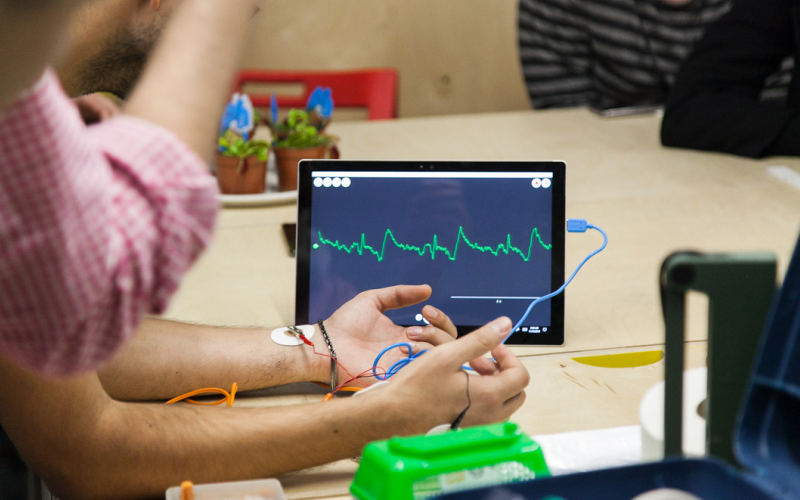Neuroscientist
Country: USA
This article was developed within the program┬ĀVenture an Idea┬Āfunded by the USAID.
We had a great pleasure to talk with one of the members of our community, Greg Gage, an award-winning American Ph.D. researcher, and his work has been focused on spreading the knowledge about the human brain, and most importantly on the development of affordable technology for the education of primary school and high school students.
He is one of the prominent speakers at the TED conferences and he has several TED talks online, each supporting his mission of spreading knowledge about neuroscience.┬Ā┬Ā
We met Greg a long time ago, when he first started to work in Belgrade, and we had the great pleasure to introduce his passion for neuroscience to our local community and audience, through two lectures and presentations within Nova Iskra, Belgrade. These days he is visiting our city again, and we wanted to see what he is up to, these days.┬Ā
TELL US SOMETHING ABOUT YOURSELF AND YOUR WORK
I am a neuroscientist and co-founder/CEO of the Backyard Brains, a small business that makes kits that can record the brains of humans and invertebrates (crunchy and squishy things like bugs and worms).┬Ā
Neuroscientists actually know quite a bit about how the brain functions, but the tools to understand the brain have been relegated to only large university laboratories, inaccessible to the layperson. Backyard Brains is the effort to democratize neuroscience.


WHERE IS YOUR MARKET PRIMARILY? WHERE ONE CAN SEE AND USE THE BACKYARD BRAINS KITS?
Most of our sales are from schools and universities in the USA, but about 20% of our products are sent to Europe.┬Ā
TELL US, HOW DID YOU END UP IN BELGRADE?
I am a ŌĆ£Serbski ZedŌĆØ (srpski zet) as people in Belgrade have told me. My wife is Serbian, grew up in New Belgrade, went to school in Belgrade, and traveled for work in the USA.┬Ā ThatŌĆÖs where I met her. We were married and I started traveling to Belgrade.┬Ā I ended up setting up a business in Serbia and hired hardware and software developers and our business and technical support.┬Ā
WHAT IS YOUR EXPERIENCE WORKING FROM BELGRADE?
I love it. My favorite benefit I experience while working from Belgrade is the quiet downtime in the mornings that allows me to think and reflect.┬Ā I am six hours ahead of schedule in the US.┬Ā Emails do not start coming in until 2 oŌĆÖclock, and I really cherish that. I like the culture of the community here, the US has more of an individualistic culture.
WHAT WAS THE BIGGEST CULTURAL CONTRAST YOU NOTICED WHEN YOU MOVED HERE?
In Belgrade, there is less concern about safety than in the US. As a father, I find this liberating. Here, kids are able to do their own thing without a parent guarding over them. There is less coddling which allows the child to become more independentŌĆ” it reminds me of when I was a child. In the current US culture of safety, innovation could suffer due to a fear of risk. If everyone were concerned about safety, we would have never landed on the moon. If you are always trying to remove any chance of risk, you are not going to make strides in humanity. We humans should think more carefully about what is an acceptable riskŌĆ” Serbia has done a better job.┬Ā
WHAT WOULD BE YOUR SUGGESTIONS FOR IMPROVEMENT OF THE SERBIAN ECOSYSTEM ┬ĀIN ORDER TO MAKE THIS COUNTRY AND CITY EVEN MORE APPEALING FOR DIGITAL NOMADS, ENTREPRENEURS AND INTERNATIONAL PROFESSIONALS LIKE YOURSELF?
The taxing of startups or small companies would be something I would suggest changing. In the US you pay fifty dollars to register a company and you donŌĆÖt pay taxes until you start to make a profit. It encourages more risks. That is how my company started; we didnŌĆÖt have anything in the beginning. This issue is in Europe in general. Additionally, I would suggest making more workshops on how to get funding as a small business.
HOW CAN YOUR BUSINESS INFLUENCE BELGRADE CULTURE?
One of the main things my company in Belgrade is trying to accomplish is to prevent brain drain in Serbia. We are employing people to work for our company but giving them the option to stay in their country. In addition, we are trying to bring funding from the EU to help the Serbian economy. With the goal to involve more Serbians in neuroscience.┬Ā We have many scientific publications done with Serbian co-authors. In the near future, the plan is to do a series of workshops in Belgrade, with the aspiration of delivering a more advanced and diverse STEM education here.
HOW HAVE YOU SHARED YOUR WORK IN BELGRADE?┬Ā
I had a chance to be a part of Nova Iskra public lectures, with several presentations. One of my favorites was called ŌĆśŌĆÖMental Chronography: Clocking the inner workings of the human brainŌĆÖŌĆÖ which looked at how quickly we make decisions and another highlight was about the neurology of plants, called ŌĆśŌĆÖSignalization and behavior of plantsŌĆÖ. What I especially loved about these talks is the freedom I had to converse about the topics that were foremost interesting to me.


Find out more about Greg Gage:
This article was made possible by the support of the American people through the United States Agency for International Development (USAID). The contents of this article are the responsibility of Nova Iskra and do not necessarily reflect the views of USAID or the United States Government.
